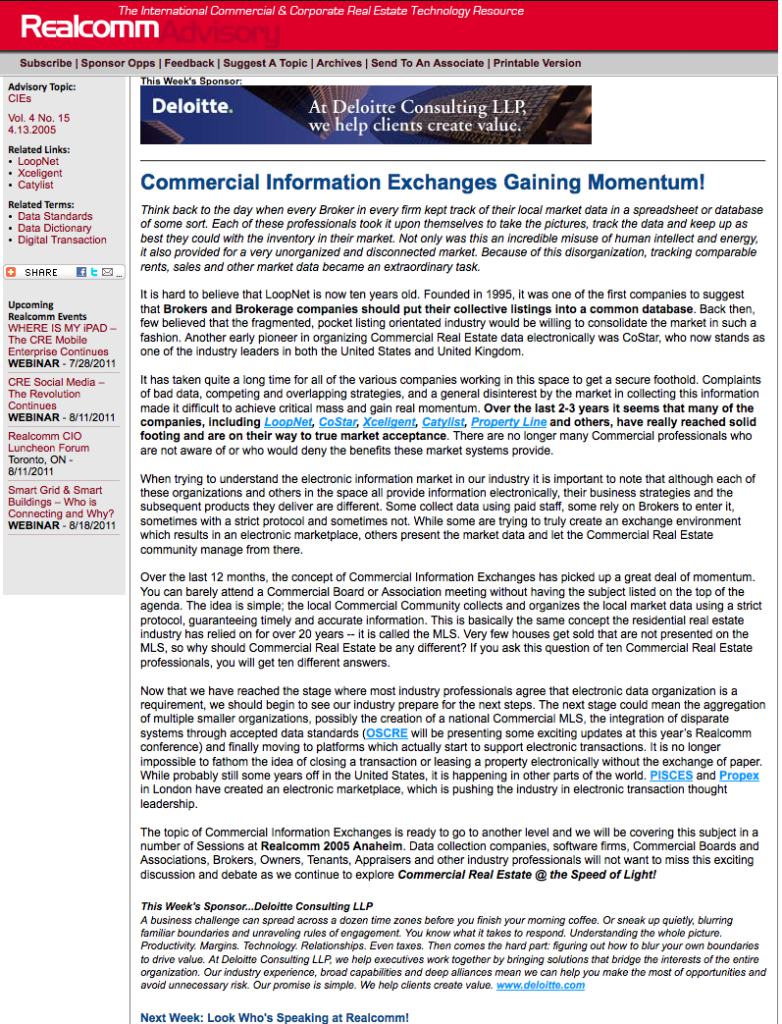Minneapolis Commercial Real Estate Landlord Provides Insights Regarding Online Services Available to Commercial Real Estate Professionals and Prospects.
Comprehensive property databases that act as local, regional, and national exchanges have become popular only recently although national services have made data available online for several years now. Most major markets and a number of secondary markets have successfully implemented exchange platforms to provide local professionals with good information to use in transactions.
One of the top and emerging trends that illustrate technology’s growing influence in the brokerage arena is using CIEs to facilitate deals. The idea of sharing listing and market information also is taking hold along with distributing contact information among team members. During the next few years, CIEs are likely to become the cornerstone of most transactions in the brokerage industry.
What is a CIE?
A Commercial Information Exchange (CIE) is the commercial real estate equivalent of the residential Multiple Listing Service (MLS). A local association operates this Internet-based commercial property listing service to serve the local market. Types of properties which may be submitted (depending on local rules) include: subdivided vacant land, land and ranch; business opportunity including some interest in real property, motel/hotel, mobile home parks, commercial income, industrial, investment, and office space. There are less than 100 CIEs in the United States. There was a great CIE resource on wikipedia that discussed CIE’s in their early inception (circa 2005). It appears that the link to this article is no longer active ( http://www.realcomm.com/advisoryfullframe.asp?aid=146 ). I was able find a screen shot of the link before it went dead (see image below).
What is their function?
CIEs enable commercial real estate professionals to share market statistics, contacts, and information commercial property, lease transactions, or recent sales. Existing in larger markets with a more organized and developed commercial real estate industry, CIEs vary in scope, serving cities, states, or larger regions, and depending on the depth and breadth of data in a particular market, also in function. For example, The Commercial Real Estate Network (CREN) is a CIE that includes information about office space, retail, industrial, commercial, multi-family, land and ranch, subdivided vacant land, and business opportunities.
Important points about CIEs:
• Participants who have been retained by sellers and sellers of commercial or industrial property may submit property information voluntarily with written authorization to the CIE. It is not essential that a Participant retained by a property owner to market the property have an exclusive right to sell, exclusive agency, or open listing.
• Being an information exchange, no offers of cooperation and compensation are communicated by filing information on a property with the CIE. These must be made on an individual basis outside the CIE between the Participants involved. Participants acting on behalf of buyers may submit information describing the type of property sought even if the Participant is not the buyer’s exclusive agent, while those acting on behalf of sellers or lessors must submit their written authorization.
• Upon agreeing in writing to conform to the rules and regulations and to pay the costs involved, any REALTOR® (principal) is eligible to participate in the Service. Brokers and salespeople are neither ‘members’ nor ‘participants’. However, they may use the Service through the Participant (principal) with whom they are affiliated.
• Regardless of Board membership status, no individual or firm is eligible for participation or membership unless they hold a current, valid real estate broker’s license and offer or accept compensation to and from other Participants.
For the most part the CIE model has shifted to local associations such as MNCAR (membership site specifically for commercial real estate professionals in the Minneapolis St Paul metro area). This model is based on a paid subscription in which you have access to a cooperative group of over 1,300 commercial real estate professionals. You can send out broadcast emails reflecting requirements, as well as available spaces or buildings for lease or sale.
This particular platform is strictly a local service. That being said most states have a similar platform in place to serve their respective local commercial real estate market.
Also to be noted is that sites like Showcase and Loopnet have implemented similar platforms. The unique difference with these platforms is that the general public can easily gain access to the platforms in order to interact directly with property owners or leasing agents. Allowing business owners direct contact to the landlord’s inventory of available space, as well as their contact info to directly setup showings.
We can only assume that as technology continues to grow in leaps-and-bounds, digital media will undoubtedly be the place for commercial real estate professionals and business owners interested in commercial real estate to share and disperse information.
Cited Sources:
realtor.org:8119/commercial/commercial-information-exchange-comparison
ccim.com/cire-magazine/articles/industry-conference-highlights-technologys-role-brokerage-evolution
web.archive.org/web/20110722000407/http://www.realcomm.com/advisoryfullframe.asp?aid=146



Thank you for the very thorough explanation of emerging Commercial Information Exchange systems. This is translating into a lot of new opportunity in Minnesota commercial real estate for both agents and clients. One of the main challenges with commercial real estate in MN in the past has been the lack of a complete property database. However, MNCAR is making significant strides, and it’s good to see other states adopting and implementing similar strategies. I’m also glad you mentioned Showcase and Loopnet. The direct-to-public access has it’s advantages too. More information and ease of communication is a positive thing. Someone searching for office space Minneapolis has the opportunity to get access to information and schedule a viewing independently and at their convenience. Ultimately, this is great for the market, and good for everyone involved. Indeed, there may be some sticking points as you mentioned, but good groundwork has been made.